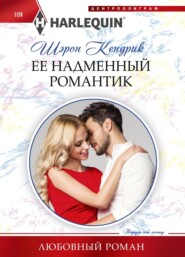По всем вопросам обращайтесь на: info@litportal.ru
(©) 2003-2024.
✖
Consultant Care
Автор
Год написания книги
2018
Настройки чтения
Размер шрифта
Высота строк
Поля
‘My name is Leander,’ he told her reluctantly in that deep, deep voice which sounded exactly like rich, runny honey spilling slowly over gravel.
‘That’s rather . . . unusual,’ said Nicolette lamely, the curiosity remaining in her blue eyes.
He frowned, then sighed, as if recognising that some kind of explanation was in order. ‘It’s Greek for “lion man”—as Simon has so accurately pointed out.’
Leander! Nicolette blinked. Of all the remarkable names for a man. . .‘But weren’t you teased about it at school?’ she blurted out before she could stop herself.
He looked taken aback, as though the question had surprised him, and Nicolette suspected that he would not have chosen to answer it, had not Simon butted in eagerly.
‘Did they, Doctor?’
The tall man’s eyes rested thoughtfully on the young boy, and he nodded slowly, as though he had guessed Simon’s true reasons for asking. ‘Yes,’ he said slowly. ‘They did try to tease me. But they didn’t succeed.’
‘Because you’re big, and tough,’ hazarded Simon gloomily. ‘And could knock them down with a punch.’
But Dr Le Saux shook his head. ‘No, Simon,’ he responded quietly. ‘If you resort to physical violence then you’re putting yourself on the same level as the cowards who are bullying you—and believe me, that’s all that they are, nothing but pathetic cowards.’
‘Then. . .how did you get them to leave you alone?’ asked Simon diffidently, and Nicolette’s heart turned over in sympathy for the young lad, for it was transparently obvious that he must have been the butt of bullying himself.
‘By ignoring them,’ Dr Le Saux answered sternly. ‘Simple, but effective. They soon get bored repeating something if they can see that it isn’t upsetting you.’
‘And if it is upsetting you?’ said Simon falteringly.
‘Then you pretend. Pretend it isn’t, and soon they’ll stop. And if you can practise giving them a pitying little smile like this,’ and he curved his mouth into the haughtiest look of pride that Nicolette had ever seen, ‘at the same time,’ he carried on, ‘then they’ll steer well clear. Try it,’ he advised softly. ‘It works; I promise you.’
Simon nodded slowly, as if a promise from this particular doctor was something to be cherished. ‘I will.’
Nicolette found herself watching the tall paediatrician covertly, thinking about the man, and about the name. And whoever had chosen it had been spot on because yes, the name suited him. Really suited him.
He had impressively broad shoulders, which suggested strength, and the lean musculature of his long limbs marked him out as hunter, protector and provider. And here, standing beside the window, where the sunlight streamed in on them, she could see that his hair was not merely very thick and dark, as she had thought when she had first seen him, but that it also had the most astonishing dark red lights dancing in its depths, and, although it was neatly trimmed, its very thickness and intriguing hint of unruliness were not dissimilar to the texture of a lion’s mane. . .
She came out of her fanciful daydream to find him staring at her, a look of faint question in his eyes, and Nicolette realised that she must have been standing there ogling him! Oh, dear! She hastily cleared her throat. ‘Er—any more questions you wanted to ask me?’
‘I was going to ask you about the outlook,’ he told her softly.
For a moment her brain was complete mush. ‘The outlook?’ she echoed stupidly.
‘Of cystic fibrosis,’ he explained crisply.
Of course. Thank heavens to have something concrete to focus her attention on, other than the magnificent lion-like qualities of the man who stood in front of her! Nicolette didn’t falter. ‘The long-term survival has improved considerably in recent years, and there are now a great many adult CF patients who are leading fulfilled lives. In the meantime the adults of tomorrow can take great comfort from knowing that a vast amount of research is being done into the disease.’ And she gave Simon’s hand another tiny squeeze.
‘That’s what I keep telling Simon,’ said Dr Le Saux quietly. ‘But you take a lot of convincing, don’t you, my lad?’
Nicolette’s eyes were shining as she looked down at the patient. ‘Well, I’ve said it, too—and I wasn’t primed to, was I? How many more people would you like to repeat it to you, Simon, before you believe it?’
Simon’s eyes were serious beyond their years, but his voice didn’t have a trace of self-pity in it. ‘I know that what you say is true,’ he said. ‘An’ I’ve always believed Dr Le Saux. He’s looked after me since I was a baby. In fact, Mum and Dad moved down to this part of the world so that he could look after me, didn’t we, Doc?’
Nicolette blinked in surprise as she stared at the consultant. She could never have imagined the tall, imposing doctor looking vaguely disquieted, but he did now. He was, she realised with a surprised glee, embarrassed at Simon’s obvious hero-worship and glowing testimony! Strange, that. She would never have had him down as being modest!
‘Is that so?’ Nicolette asked softly.
The dark head with the red lights in it was shaken impatiently as he appeared to contradict Simon’s words. ‘The sea air acts as a tonic,’ he shrugged self-deprecatingly, adding as he saw the quirk of amusement which curved the corners of Nicolette’s mouth, ‘And yes, that may be a very old-fashioned idea, Staff Nurse, but I happen to believe it’s true.’
‘But so do I!’ agreed Nicolette, feeling almost shocked. She could never have imagined agreeing with anything said by the stern-faced man she’d grappled with in the bathroom!
‘Don’t take any notice of him,’ said Simon again. ‘It’s not just the sea air—he does research into CF here, too.’
Nicolette looked into eyes whose green flecks had intensified, giving him the enigmatic appearance of a cat. ‘Do you?’
‘Yes,’ he said, giving her a resigned look. ‘On a very small scale, of course.’
‘Rubbish! He’s a world authority,’ put in Simon cheerfully, ignoring the blatantly warning expression on Dr Le Saux’s face.
Curiouser and curiouser! Nicolette made a mental note to take herself off to the reference library when she finished duty to read something he had written. ‘Researching into any particular aspect of cystic fibrosis, Dr Le Saux?’ she asked politely, but it was difficult to keep the admiration out of her voice. Research, she knew, was not done for any of the kudos that surrounded the status of doctor. It didn’t earn you money, and it ate away at all your time. People who researched tended to do it because of their thirst for knowledge; and for results that would hopefully bring about improvements to a patient’s life. Nicolette had always held researchers in the highest esteem.
He shrugged his broad shoulders restlessly. ‘I’m searching for the cure,’ he said starkly, finishing on an altogether different note. ‘But there again, isn’t everyone?’
For Simon’s sake, Leander managed to disguise the note of cynicism that was threatening to creep into his voice but it took a huge effort as usual, especially with that young, rather beautiful nurse staring up at him like that with those amazing shining blue eyes, and all because he’d mentioned his foolish little bit of research. What did she think he could do by sitting up night after long damned night, studying tissue samples? Rid the world of this illness? And, even if he could, nothing would change, not really. Because then he would go on to try to find a cure for the next disease, and the next, until his own time had run out. God help us to rid the world of all illnesses, Leander thought bitterly, but especially those which affected young children. . .
But Nicolette heard the faint underlying note of cynicism, heard and understood it, and her tender heart couldn’t help warming to him, arrogance or no arrogance. ‘That’s absolutely wonderful,’ she breathed sincerely, not really caring if she sounded a bit over the top in her praise. ‘I think that research must be the most worthwhile thing in the world any person can do.’
But he knitted his dark brows together, as though she had just called him names. ‘Thanks for the recommendation,’ he said, with crisp sarcasm. ‘But we can’t really afford the time to stand around chatting—we both have work to do, do we not?’
He didn’t see the eyes-to-heaven expression which Simon gave, but Nicolette did, and it took every effort of will for her not to giggle. Let him be grumpy if he wanted—if the man was a researcher then she’d forgive him an awful lot! ‘Yes, Doctor,’ she answered demurely.
He frowned suspiciously, as if sensing the shared joke between Nicolette and Simon. ‘Then would you mind lifting up Simon’s pyjama jacket,’ he ordered shortly, ‘so that I can examine his chest?’
Nicolette did as he asked, while he warmed the stethoscope up on the palms of his strong, capable hands. Then she watched him dispassionately while he started to examine Simon, wondering what his practical skills as a doctor were like.
She should have guessed, of course. He was good, she had to admit. Very, very good indeed.
Paediatricians, who looked exclusively after children—from tiny babies to young adults—needed skills above and beyond the normal skills of other doctors. They had to be infinitely patient, and precise. They needed to be flexible and able to cope with the unexpected without blinking—which was why Nicolette had been surprised when told that Dr Le Saux demanded order. They also needed the utmost manual dexterity and a steady, steady hand. But the skill they needed above all else was that of communication—not something she would have automatically put at the top of his list of qualities! Children were famous for clamming up when questioned about their illness, and it took a special kind of adult to coax information out of them.
Extraordinary, then, that this man, who on first impressions Nicolette would have ventured had a real problem with communication, should have this little boy eating out of his hand.
There was silence while he listened to the chest sounds, punctuated only by his brief instructions to Simon to breathe deeply. And when he raised his dark head there was something approaching a smile on his hard face.
‘Good,’ he pronounced. ‘The chest sounds clear. Looks like all trace of that nasty Pseudomonas aeruginosa infection has gone.’ His eyes narrowed in Nicolette’s direction as he mentioned the rather virulent strain of bacteria to which cystic fibrosis sufferers were particularly susceptible. ‘Have we had any sputum results back, Staff?’
Nicolette nodded, heartily glad that since her early days as a staff nurse she had got into the habit of reading and memorising all the patients’ results that came back. And earlier she had tackled the pile on the desk that had included Simon’s. ‘The result of the third specimen came back this morning. With the all-clear.’
‘Excellent.’ Dr Le Saux smiled. ‘Like to go home, Simon?’
The boy’s face lit up. ‘Oh, can I?’
The paediatrican threw his hands up in mock-astonishment. ‘But I thought you liked being here,’ he teased gently.
‘I do—it’s just that home is—’

















